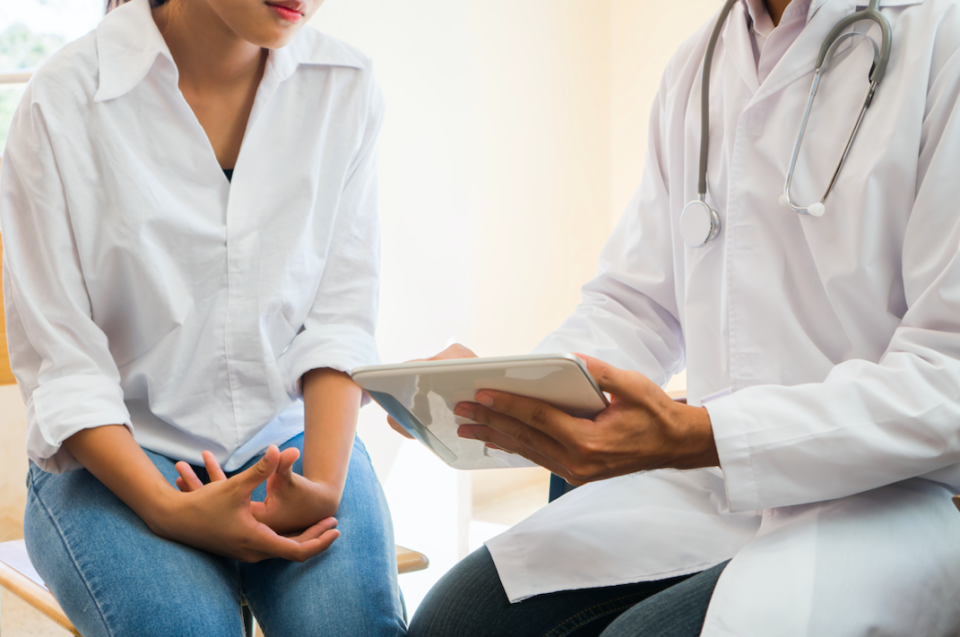A 30-year-old woman has sadly passed away from endometriosis complications

Yesterday, news broke on social media that a 30-year-old endometriosis awareness campaigner, Aubrion Rogers, had sadly passed away from complications related to the condition. Aubrion, who was diagnosed with the condition in August 2020, had been sharing details of her endometriosis struggle online with other sufferers. But, over the weekend [22 January] her husband posted the heartbreaking news that she had died following emergency surgery.
Last year, Aubrion had taken to social media to express her frustration that her condition was not being taken seriously. "I have been in pain daily for months. Today I went to urgent care and asked for an ultrasound," she said in a post online [per @endo.samantha]. "Found out that I have three fibroids, one cyst, one enlarged ovary and one large mass that is 11cm. At what point will my situation be considered an emergency?"
Speaking about Aubrion's tragic passing, fellow endometriosis awareness campaigner @endo.samantha said in an Instagram post: "Endometriosis can be fatal, if left untreated. We need to raise more awareness, continue to stay in the fight, and advocate for our health and our pain and the community of our endo sisters and warriors, because this should not have happened."
In the comments section, endometriosis sufferers shared their own experience of having their pain dismissed, and their concerns surrounding how dangerous the condition can be. To find out more about the complications associated with endometriosis and, more importantly, how to spot them, we spoke to two experts.
"Endometriosis is an inflammatory condition where tissue, similar to the lining of the womb, grows outside it in other parts of the body," explains Dearbhail Ormond, founder of endometriosis community platform, Frendo, who was diagnosed with Stage 4 endometriosis at the age of 33 after an 18-year battle. "Essentially, it's a chewing gum-like structure that can stick organs together, and to other parts of the body, causing a great deal of pain."
Symptoms of endometriosis vary from person to person, but typically include extreme period pain (that prevents you from carrying out your day-to-day activities), heavy periods, and pain during or after sex.
As for the common complications associated with endometriosis, these include difficulty getting pregnant, infertility, chronic pelvic and back pain, and chronic fatigue. In some cases, points out Dr Nitu Bajekal, obstetrician, gynaecologist and co-author of Living PCOS Free, people with endometriosis can develop painful ovarian cysts. They may also experience painful bowel or bladder symptoms, resulting from dense scar tissue around these organs.
"Serious but uncommon risks can also occur during surgery [if this is a required outcome]," Dr Bajekal explains, noting how endometriosis can cause pelvic organs to stick together. In some rare cases, this can result in "removal of parts of the bowel or bladder, with a longer recovery and sometimes longer term issues (such as a colostomy bag)." Other rare risks include severe post operative bleeding and ovarian cancer.

With that in mind, how rare is it that someone could pass away from complications related to endometriosis? While it's difficult to comment directly on Aubrion's tragic case without a full coroner's report, Dr Bajekal emphasises that "it is extremely rare to lose someone because of endometriosis" – referencing her 35-years of experience as an ObGyn.
Frendo founder Ormond agrees, noting that while this devastating outcome is "relatively rare", Aubrion's experience leading up to her tragic death is not. "Aubrion was so utterly let down by the system, not only at the point of her premature death, but in the years before when she tried so hard to get the help she required," Ormond told Cosmopolitan UK.
"There are hundreds of thousands of women out there searching for answers and asking to be heard; all the while the progression rate of the disease worsens, ravaging our organs, chronically invading our relationships, penalising our careers due to ill health and suppressing our fertility."
What to do if you're concerned about endometriosis
"If you are concerned about painful or heavy periods, pain during vaginal intercourse, bowel or bladder symptoms (especially pain or blood while opening bowels/passing urine), or struggling to fall pregnant, don’t delay in seeing a doctor," says Dr Bajekal. "Ask for a referral to a specialist so that the right tests, including scans and treatment (medical or surgical), can be discussed and started sooner rather than later. It takes an average of 6.7 years to be diagnosed with endometriosis, and an early diagnosis will give the best outcome."
To learn more about endometriosis, or to reach out for support, call Endometriosis UK on 0808 808 2227, or join their online community, here.
You Might Also Like


